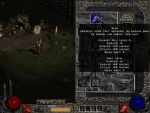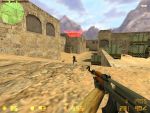Player vs Player in a roleplay game

Diablo 2
Player vs Player is a concept where a real person fights or competes against another real person in a videogame. A few good examples for this are racing games, first person shooters and beat em ups, games where the single player part usually emulates the multiplayer part. But what happens when this concept is applied to a classic roleplay game?
First of all we define a classic roleplay game. You play your character and try to evolve, learn new abilitys, collect experience, obtain items and go on adventures either alone or in a group. During this whole process of character evolution there is one thing that you always try to avoid and that is dieing. Some games even go as far as having perma death, if your character dies its game over.
Now we can apply different player vs player approaches to the classical rolay play game and compare, lets try to apply first person shooter logic.

Counter Strike
The first person shooter Counter Strike is famous for being very well balanced, 2 teams with an almost equal weapon arsenal face each other in a „deathmatch“ with optional objectives. Every player has the same class abilitys, the same gear and is on the same level of experience. This does not apply to a roleplay game, you have more or less experience than your enemys, you have different gear and you have different class abilitys.

Team Fortress 2
Team Fortress 2 is a first person shooter with a class system. Again 2 teams face each other in a „deathmatch“ with option or not optional objectives. There are however a set of classes / roles from which a player must choose. These roles differ in speed, weapons and there is even a healing class available. The class system can be compared to a roleplay game and works well, however the difference in gear and experience still applys.
In most multiplayer first person shooters you don’t have to evolve your character, you don’t gather experience in the same extend as you do in a roleplay game. You dont see your character grow up and you don’t get used to it and most of all you don’t learn to avoid death. Dieing in first person shooters is somewhat natural, its frustrating to a certain degree but thats more related to the waiting time between your death and the next round. Death in a roleplay game however is very frustrating, you’ve put so much effort into your character and see it all shattered, even if you know you will get ressurected. Death means you did something wrong, you do not want to do that again, you want to learn from it compared to the shooter where it simply means try again in 30 seconds.

Need for Speed
Racing games are a very different genre, you can compete with others by seeing who reaches the finish line first. In a video game its simple to provide all participants with the same vehicle so everyone has the same chances apart from the starting position. But how can this be applied to the roleplay genre? As previously stated the roleplay game consists of character progression, obtaining items and adventures. Now this just has to be modified to be a virtual finish line, whatever character or group reaches a certain level of progression or completes an adventure first will be the winner. Like this the neccesary death scenario of first person shooters can be avoided which will result in a much lower frusration level. Even a loss does not cause the same level of frustration since you still managed to complete the adventure or progressed your character. You achieved something.

Guild Wars 2
A lot of massive multiplayer roleplay games decided to go for the direct player vs player approach where players attack each other. To counter issues such as different experience levels in for example guild wars 2 all characters will be pulled to the same level in a player vs player enviroment. Even different gear progression can be countered by providing everyone with the same gear , however the biggest frustration factor will always stay and that is death. Maybe in the future we will see completely different approaches in the future.
‹ Dynamic Dungeons Website updated ›